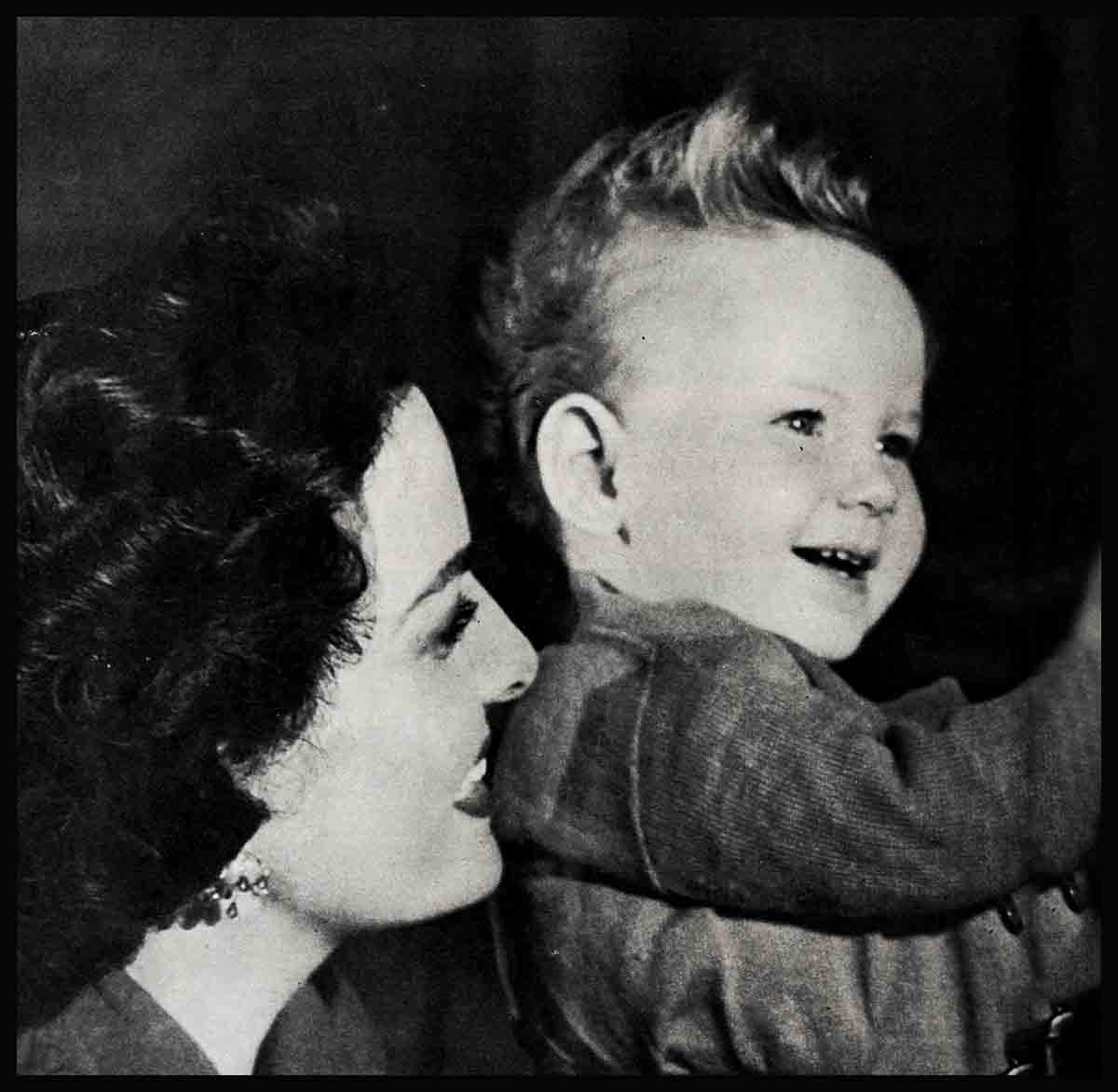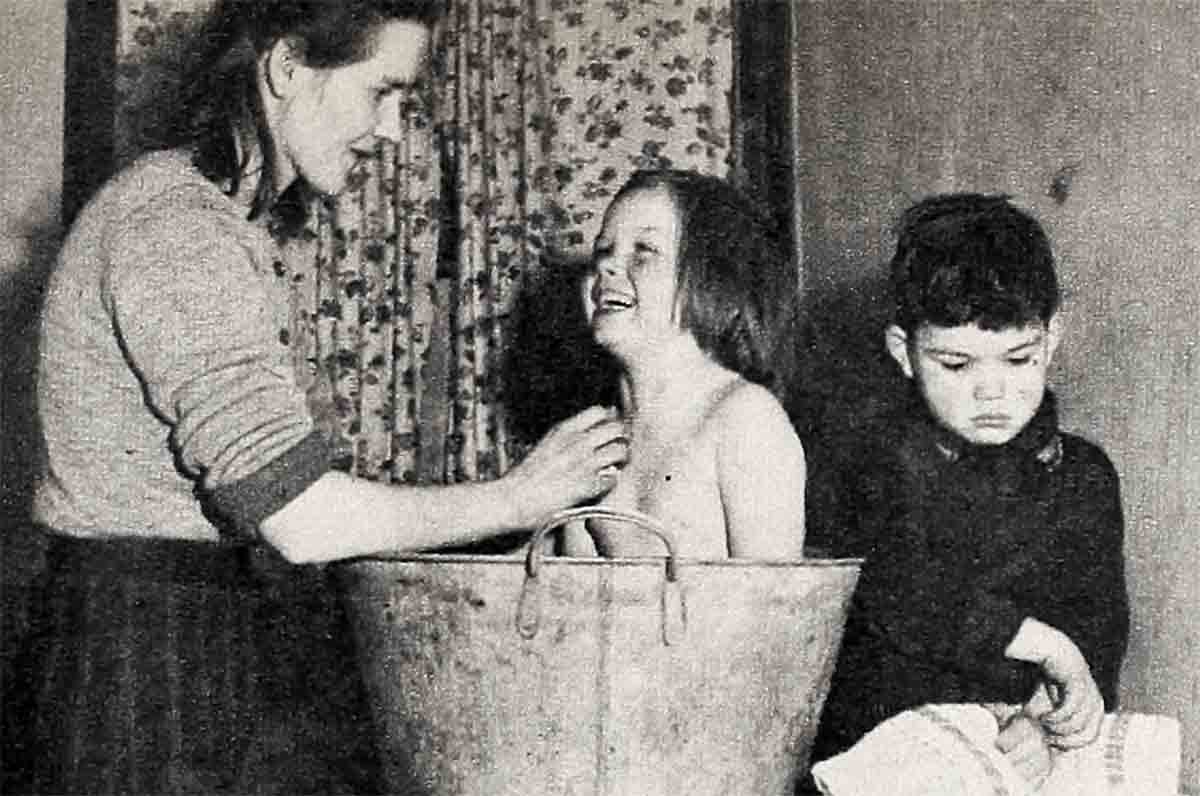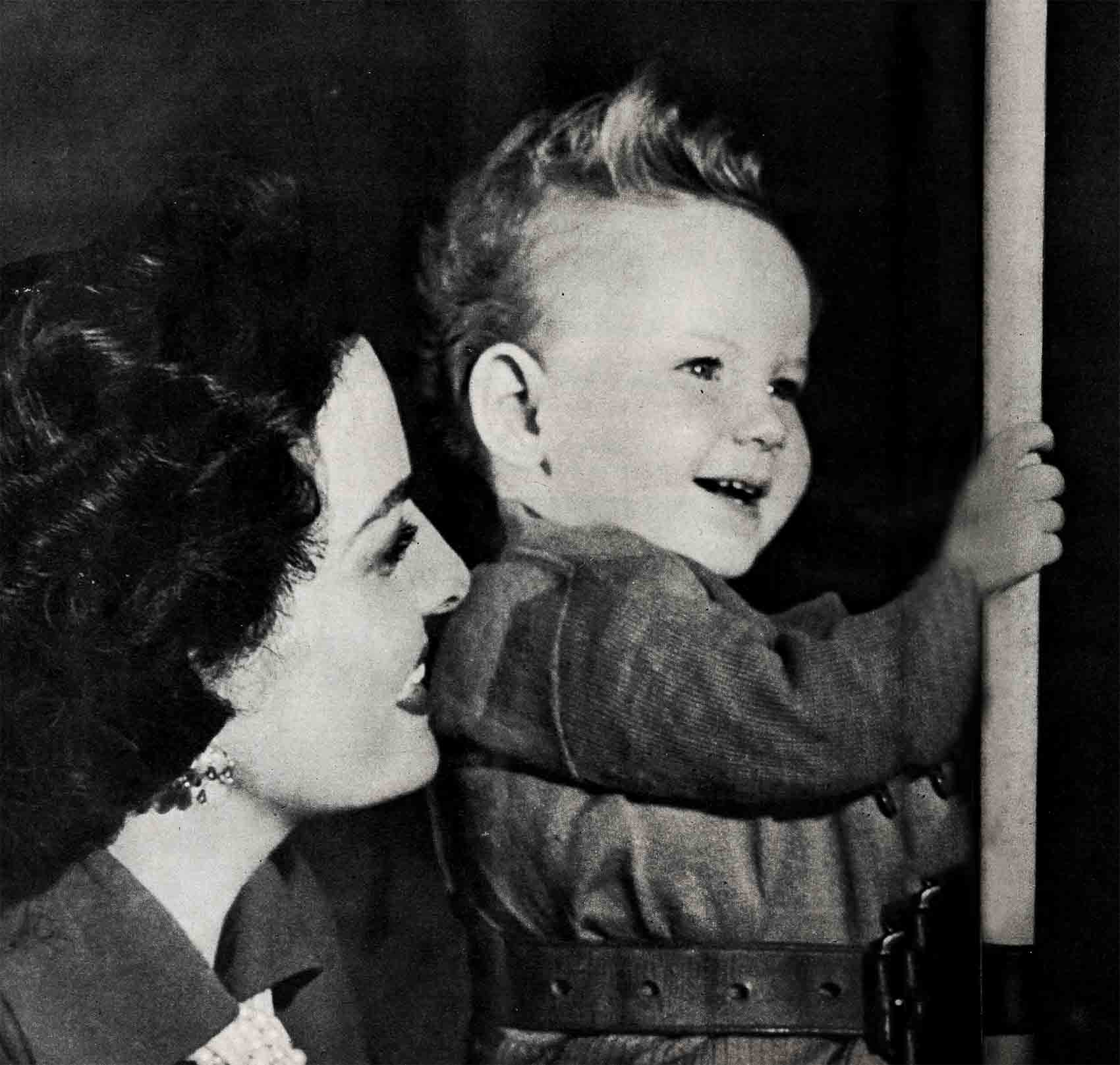
Jane Russell’s Fight For Her British Tommy
When Jane Russell disembarked last November from an overseas plane, she had with her, you will remember, a baby boy. He was Tommy, fifteen months old, blond, blue-eyed, and as Jane’s mother described him, “a bit of heaven.”
That she was going to adopt Tommy, Jane emphatically denied.
“There is a child in Frankfort, Germany, whom I am interested in adopting through the proper channels,” she said, “after I talk it over with my husband.
“I have tried for months to adopt another child in the United States without success . . .
“Tommy’s mother,” she concluded, refusing to mention the baby’s family name, “begged me to bring her child to America, to see if I could not interest some of my friends in taking him for their own so he could have a good life.”
Whereupon Jane boarded another plane for California and Tommy disappeared from public view, disappeared into the vastness of the Russell-Waterfield home in the San Fernando Valley, a redwood house high on a hill, reached by a driveway so almost perpendicular that many visitors close their eyes during the steep ascent.
There in a sunny nursery which he shares with Jane’s adopted daughter, Tracey, thirteen months old, also blonde and blue-eyed, Tommy is cared for by a Scotch girl with such a lovely soft burr that his prattlings have come to have Scottish overtones, too.
There, too, in a sunny enclosure surrounded by garden and overlooking a great big swimming pool, Tommy plays with his sister and his nurse and romps with his mother and father; one of Jane’s delights is picking him up—as she does the husky, twenty-three pound Tracey too—and swinging him between her legs, to his great joy. He never gets enough of this rough house. Neither does Jane. “I used to be able to get dressed in twenty minutes or less,” she says. “Now I allow myself an hour, because I know I’ll stop to play with the children.”

A far hail, all this, from the drab two-room flat in which Tommy lived in London with his parents, Anna and Michael Kavanagh, the latter a thirty-seven-year-old carpenter foreman, his sister Theresa, aged five, and his brother Michael, who is three years old.
Photoplay’s correspondent in London visited Mrs. Kavanagh at her home to bring you first-hand information. Here is her report as given to me.
It was through the London newspapers that Anna Kavanagh learned that Jane Russell was looking for a baby. “The paper said,” she explains, “that Miss Russell was at the Savoy. It took me a long time to get up the nerve. But at last I wrote her a letter, told her about Tommy and begged her to see him.
“Tommy,” she adds, “is my third baby. After the second child I had a nervous breakdown. And the worry of having a third and keeping the house and scraping the money together for everything was beginning to get me.
“I have always loved Jane Russell’s pictures. And when she sent word for me to bring Tommy to the Savoy to see her, I was very nervous but very happy. I knew once she saw him she would love him as much as I do.
“I asked one of my friends to come with me but she wouldn’t. So I went by myself. Miss Russell picked Tommy up and cuddled him and told me how lucky I was to be a mother.
“She and Tommy loved one another from the first moment. He laughed with delight. I could see how happy he would be with her.
“When I told my husband what had happened he wasn’t pleased. But, of course, nothing had been decided. Miss Russell had said she would get in touch with me. We have no telephone, so it wasn’t until a few days later that I got the news that because of the law Tommy could not be adopted by an American.
“I thought he had missed his chance to be somebody! Then it was suggested we send Tommy to the States with Miss Russell on a visit! Both my husband and I were born in Ireland. So Tommy can have his choice of either Irish or English citizenship. We decided on the Irish so that he could leave the country. We didn’t expect to be in the papers or have all this fuss about us.
“My friends,” she says, sarcastically, “all say I’ve done the wrong thing giving up my baby.” She adds, “I want my Tommy to have the life he would never get here—”
Only twenty-seven years old, Anna Kavanagh has the face and frame of a woman gaunt and tired before her time.
While she talked, our London correspondent reports, little Theresa and Michael sat on the floor, pulling their shoes on and off in a mysterious children’s game. They looked healthy enough but ill-kempt. To bathe them Anna Kavanagh has to haul out a big tin tub, set it up in the middle of the sitting room and dunk them into it.
“Since Tommy left,” she says, “I have had nearly a dozen offers for the other children, one from a titled English lady. My husband and I still haven’t made up our minds what we will do. I don’t feel I shall be strong enough to give them the care they should have. And with prices going up things will be even harder.

“I want my babies to have a better life than I had. My husband and I love each other and we’re used to it like this. A few days’ holiday by the sea—and each other—that’s enough for us and we’re happy. But I couldn’t face the thought of the children not having more in their lives.
“We shall never stop being grateful to Miss Russell for what she is doing for our Tommy. It seems like years since last November when he waved goodbye to me from her arms. My husband and I think of him every day. We pray for him to be worthy of this wonderful chance to have a full life. We hope he will be a good son to Miss Russell and Mr. Waterfield and row up to be a famous footballer too.”
All of this makes it apparent that Jane ‘was hedging last November when she talked with reporters about her intentions about Tommy. Likely enough, too, the German child she mentioned was a “red herring” with which she sought to put the press off the track. Undoubtedly, she was hoping her husband, Bob Waterfield, would be as charmed with Tommy as she had been and that somehow, some way, his adoption could be arranged.
There were problems, great and many. As Jane said at the time, it is never wise to adopt a child beknownst to his parents. Too often this leads to trouble or heartache later on. Also, while in London she had been informed of the British Child Adoption Act which makes it illegal for a British subject to be adopted by citizens of another country who are not blood relatives. Moreover, Howard Hughes, who discovered Jane and to whom she is under contract, disapproves of his glamour girls being publicized in domestic roles.
But Jane had seen Tommy. She had held him in her arms. She had felt his cheek soft and warm and trusting against her face, against her heart. And these simple things had managed somehow to outweigh everything else.
That Bob Waterfield almost at once felt the same way Jane did about Tommy was soon evident. One month after Tommy arrived in California, an overseas call went through for the Kavanaghs at a neighbor’s house. Jane and Bob would, they said, like to adopt Tommy legally.
This ended Tommy’s obscurity. The British Crown would have none of it. Anna and Michael Kavanagh pled guilty to the charge that they had defied the Child Adoption Act. And Tommy’s name and Jane’s name leaped into headlines in newspapers both here and in England.
There is, it seems, more to the Child Adoption Law than meets the eye. It is designed to prevent white slavery and other forms of abduction. Furthermore in this case national pride also reared its head. On Tommy’s adoption there were, in London, two sides, both violent. Some felt the proposed adoption of Tommy to be a slap in the face to the British way of living, that if a Hollywood movie star could move in and take her pick of Britain’s younger generation it implied Britain was too poor to care for her own. Others applauded the sacrifice of Anna and Michael Kavanagh, in giving up their child so that he might have a better life than they ever could hope to provide for him.
Finally, by explaining in detail the extenuating circumstances which had influenced them to offer Tommy to Jane Russell for adoption, the Kavanaghs were dismissed conditionally for a year. And Tommy was permitted to remain with Jane and Bob and his new sister Tracey in the big redwood house.
The Howard Hughes edict about maternal publicity remains firm. And Jane abides by it. Neither Tommy nor Tracey appears with her in public. They are not photographed with or without her for publicity purposes. And she does not talk about them when reporters or interviewers are around, unless she forgets and comments, impulsively, that Bob Waterfield is pretty helpless about any diaper routine.
“However,” she says, “he’s looking forward to camping trips with his son. Wouldn’t it be awful if Thomas grew up to play a violin and Tracey turned out to be the athlete. . . .”
Then she laughs. And by the way she laughs you know she does not for one moment think that this will happen, that, with Anna Kavanagh, she dreams of Tommy growing up healthy and vital, having a full and happy life.
THE END
—BY ELSA MAXWELL
It is a quote. PHOTOPLAY MAGAZINE SEPTEMBER 1952




